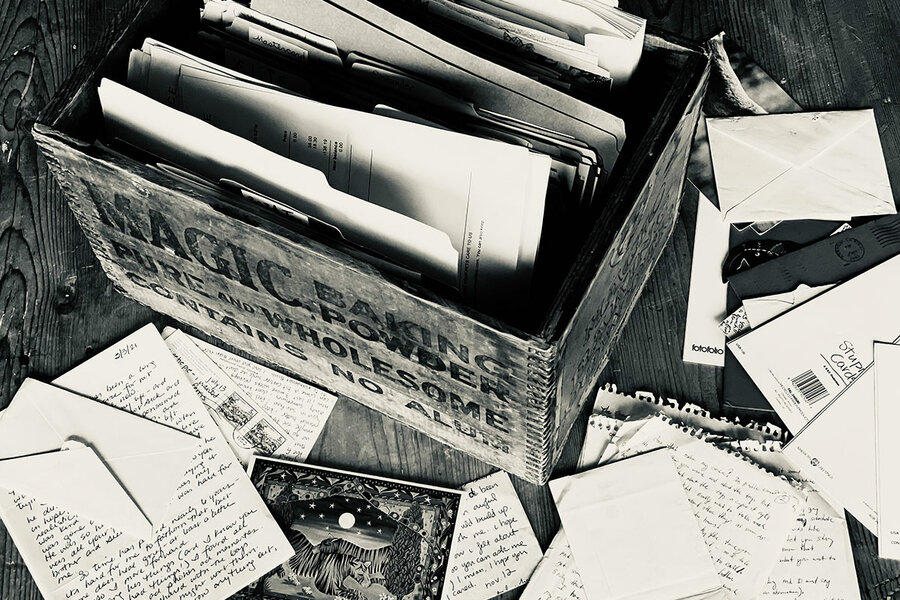Keepsakes and memories: Finding, in the clutter, a life well lived
Loading...
Last year, preparing to move to Italy, I sorted through everything in our New York apartment: clothes, toys, china, board games – you name it. I had to determine what to give away, throw out, or ship overseas.
It forced me to review, remember, and relive my past.
Why We Wrote This
A story focused onTaking a long look back “someday” becomes today, when a life change forces decisions about what to keep and what to throw away.
I found the letter President Ronald Reagan sent to my father, congratulating him for his service to the deaf community; playbills for 1960s Broadway hits my nana had taken me to see. I had rejection notes from magazine editors, a ledger tracking my meager freelance earnings, and a typed letter from my lawyer uncle counseling me to quit fooling around and get a real job. I kept Father’s Day cards and a poem to my wife on our 40th anniversary.
Paper still has a purpose, I concluded. I had tangible proof of a marriage navigated, children raised, and struggles won or lost.
I did it mostly for me. But someday my successors may happen across these keepsakes. Perhaps they’ll be drawn to explore the history only our family can claim.
As legacies go, one could do worse.
Last year, getting ready to move to Italy from the United States, I sorted through every possession in our New York apartment belonging to our family of four. Clothes, shoes, toys, china, silverware, handbags, board games, cosmetics – you name it. My mission was to determine what to give away, what to throw out, and what to pack and ship across the Atlantic.
This exercise forced me to review, remember, and, in some cases, relive and reevaluate my past. Some surprises awaited me. For starters, in rummaging through all the material goods accumulated over a lifetime, I rediscovered just how much I value paper.
Yes, paper. There’s the letter from President Ronald Reagan that my father received in 1983 congratulating him for his service to the deaf community; the sympathy card my wife addressed to me, saying – only half-jokingly – “Because you are so annoying, my heart goes out to you”; and all the birthday cards our son and daughter received from my late beloved mother-in-law, Antoinette.
Why We Wrote This
A story focused onTaking a long look back “someday” becomes today, when a life change forces decisions about what to keep and what to throw away.
Oh, I had plenty of paper all right: playbills for Broadway hits such as “Oliver!” from the 1960s that my nana took me to see; a 1968 brochure from the Boy Scouts about careers in journalism; narrow scrolls from a miniature teletype detailing my interview with my mother about her experiences growing up deaf. I had rejection notes from magazine editors, a ledger tracking my meager earnings as a freelancer in my 20s, and a typed letter from my uncle the lawyer counseling me to quit fooling around for crying out loud and get a full-time job.
I perused it all for hours a day, a forensic forage that took me weeks to complete. I left no page unturned.
I kept all the items mentioned above. I also set aside a college term paper on Leonardo da Vinci (for which I received an A) and an essay for a course in human relations (a C-minus, the professor scrawling “phony” on it).
I kept a note from an early boss granting me a long-awaited raise, and a later note from a different boss congratulating me on my job performance. I also retained a cherished make-believe newspaper about me that our daughter created in my honor for Father’s Day, and a poem to my wife on our 40th anniversary.
Down the rabbit hole I went, following my paper trail, the hard copy of my life.
It proved to me that paper still serves a purpose, even with life going aggressively digital and all but paperless. Flipping through records that you can feel on your fingertips is a powerful trigger for memories. To me, paper is the ultimate mnemonic device. Today’s millennials may someday feel the same twinges of recollection scrolling through old text messages and Instagram posts.
Going through these documents was an opportunity to better know myself, to recognize who I was and how I’d changed.
The bulging folders I curated are now once again within easy reach here in Italy, stored largely in a three-drawer file cabinet in our garage. I have no regrets about what I decided to save and what to jettison. Almost nothing important in my life is untraceable. Somehow I’ve managed to get just about everything in writing.
In the end, my paper chase gave me tangible, irrefutable, verifiable proof of a life lived: a marriage navigated, children raised, business transacted, and struggles long since won or lost. It’s a life lived to the fullest.
Yes, I saved these papers for my own sake, as if to keep a fire burning to warm me through my third act. But I’ve looked beyond myself, too. I’m also seeking to preserve my family archive for the potential benefit of future generations, starting with our son Michael, daughter Caroline, and 4-year-old granddaughter Lucia.
For all I know, somewhere down the line my successors will happen across these keepsakes. They’ll thumb through this pulpy, fibrous stuff called paper, the sheets creased and crinkled, stapled and paper-clipped, a stain here, a rip there. No memory stick will have to be plugged in. There will be no link to click and nothing to download. And I hope they’ll be drawn into learning a little something about the history only our family can call its own.
As legacies go, one could do worse.







